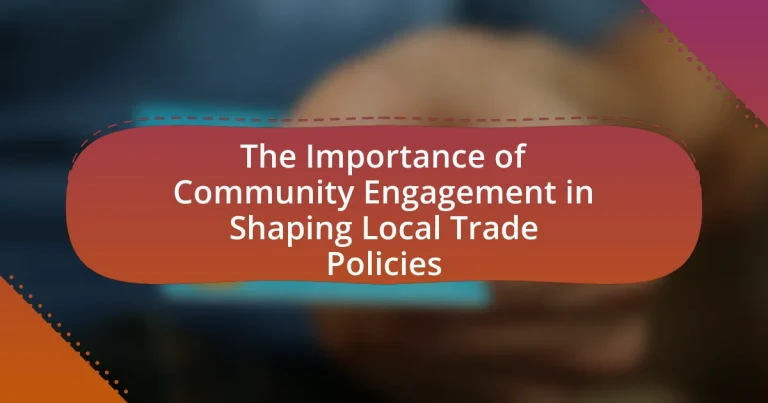Community engagement is a vital component in shaping local trade policies, as it ensures that the needs and perspectives of residents are integrated into decision-making processes. The article explores how active participation from community members enhances transparency, accountability, and trust between citizens and local governments, leading to more effective and equitable trade policies. Key elements of successful community engagement include clear communication, mutual respect, and diverse stakeholder involvement. Additionally, the article addresses the challenges faced in community participation, such as misinformation and socioeconomic barriers, while highlighting strategies for local governments to improve outreach and foster collaboration. Ultimately, the article emphasizes that engaged communities are better positioned to influence trade policies that reflect their unique economic landscapes and cultural contexts.

What is the role of community engagement in local trade policies?
Community engagement plays a crucial role in local trade policies by ensuring that the needs and perspectives of residents are incorporated into decision-making processes. This involvement fosters transparency and accountability, allowing policymakers to align trade initiatives with community interests. For instance, studies have shown that when local businesses and residents participate in trade policy discussions, the resulting policies are more effective and better received, as they reflect the unique economic landscape and cultural context of the area. Engaging the community also enhances trust between citizens and local government, which can lead to increased support for trade initiatives and improved economic outcomes.
How does community engagement influence decision-making in trade policies?
Community engagement significantly influences decision-making in trade policies by ensuring that the perspectives and needs of local stakeholders are considered. When communities actively participate in discussions about trade policies, they provide valuable insights that can lead to more equitable and effective outcomes. For instance, research conducted by the International Trade Centre highlights that inclusive stakeholder engagement can enhance policy relevance and acceptance, ultimately leading to better implementation and compliance. This demonstrates that community input not only shapes the content of trade policies but also fosters a sense of ownership and accountability among those affected.
What are the key elements of effective community engagement?
The key elements of effective community engagement include clear communication, active participation, mutual respect, and transparency. Clear communication ensures that community members understand the goals and processes involved, fostering trust and collaboration. Active participation encourages individuals to contribute their ideas and feedback, which enhances the decision-making process. Mutual respect among stakeholders promotes a positive environment where diverse perspectives are valued. Transparency in sharing information and decision-making processes builds accountability and strengthens community relationships. These elements are essential for fostering meaningful engagement that can influence local trade policies effectively.
How do community voices shape policy outcomes?
Community voices shape policy outcomes by influencing decision-makers through advocacy, public participation, and feedback mechanisms. When community members engage in discussions, they provide insights that reflect local needs and priorities, which can lead to more relevant and effective policies. For instance, studies show that communities involved in policy formulation often see better alignment between policies and the actual challenges they face, resulting in improved implementation and acceptance. Research conducted by the Urban Institute highlights that inclusive community engagement can lead to policies that are not only more equitable but also more sustainable, as they incorporate diverse perspectives and experiences.
Why is community engagement essential for local economies?
Community engagement is essential for local economies because it fosters collaboration between residents, businesses, and local governments, leading to more effective economic development strategies. Engaged communities can identify their unique needs and priorities, which helps tailor policies that stimulate local business growth and attract investment. For instance, a study by the International Economic Development Council found that communities with active engagement initiatives saw a 20% increase in local business retention rates. This demonstrates that when community members participate in decision-making processes, they contribute to creating a supportive environment for economic activities, ultimately enhancing the overall economic resilience of the area.
What impact does community involvement have on local businesses?
Community involvement significantly enhances local businesses by fostering customer loyalty and increasing sales. When businesses engage with their communities, they build trust and relationships that encourage residents to support them over larger, impersonal corporations. For instance, a study by the American Independent Business Alliance found that local businesses that actively participate in community events see a 20% increase in customer loyalty. Additionally, community involvement can lead to collaborative opportunities, such as partnerships with local organizations, which can further boost visibility and sales. This symbiotic relationship ultimately strengthens the local economy, as money spent at local businesses tends to circulate within the community, supporting other local enterprises and services.
How does community engagement foster economic resilience?
Community engagement fosters economic resilience by enhancing local networks and promoting collaborative problem-solving. When community members actively participate in decision-making processes, they contribute diverse perspectives that lead to more effective and inclusive economic policies. Research indicates that engaged communities are better equipped to adapt to economic shocks, as they can mobilize resources and support systems quickly. For instance, a study by the Urban Institute found that neighborhoods with strong social ties experienced less economic decline during the 2008 financial crisis, demonstrating that community cohesion directly correlates with economic stability.

What are the challenges of community engagement in shaping trade policies?
Community engagement in shaping trade policies faces several challenges, including lack of awareness, diverse stakeholder interests, and limited resources. Many community members may not fully understand trade policies or their implications, leading to low participation rates in engagement efforts. Additionally, stakeholders often have conflicting interests, making it difficult to reach a consensus on policy priorities. Limited resources, such as funding and time, can hinder effective outreach and engagement initiatives, further complicating the process. These challenges can result in trade policies that do not adequately reflect the needs and perspectives of the community.
What barriers exist to effective community participation?
Barriers to effective community participation include lack of access to information, insufficient resources, and social or cultural factors. Lack of access to information prevents community members from understanding the issues at hand, which is crucial for informed participation. Insufficient resources, such as time, funding, and support, limit the ability of individuals to engage meaningfully. Social and cultural factors, including language barriers and historical mistrust of institutions, can further alienate community members from participating in decision-making processes. These barriers collectively hinder the ability of communities to influence local trade policies effectively.
How can misinformation affect community engagement?
Misinformation can significantly undermine community engagement by creating distrust and confusion among residents. When inaccurate information circulates, it can lead to misinformed opinions and decisions, causing community members to disengage from discussions and initiatives that are crucial for shaping local trade policies. For instance, a study by the Pew Research Center found that 64% of Americans believe misinformation has a major impact on their understanding of important issues, which directly correlates to their willingness to participate in community activities. This disengagement can hinder effective collaboration and diminish the overall effectiveness of community-driven efforts, ultimately affecting the development and implementation of local trade policies.
What role does socioeconomic status play in participation levels?
Socioeconomic status significantly influences participation levels in community engagement activities. Individuals from higher socioeconomic backgrounds typically have greater access to resources, education, and networks, which facilitate their involvement in local trade policy discussions. Conversely, those from lower socioeconomic backgrounds often face barriers such as limited time, financial constraints, and lack of information, which hinder their participation. Research indicates that communities with diverse socioeconomic representation in engagement efforts tend to produce more equitable and effective trade policies, as seen in studies conducted by the Urban Institute, which highlight the correlation between socioeconomic diversity and policy outcomes.
How can local governments enhance community engagement?
Local governments can enhance community engagement by implementing participatory budgeting processes, which allow residents to directly influence how public funds are allocated. This approach has been shown to increase civic participation, as evidenced by a study from the Participatory Budgeting Project, which found that cities using this method saw a 20% increase in community involvement in budget decisions. By fostering transparency and providing platforms for dialogue, local governments can build trust and encourage more active participation from community members in shaping local trade policies.
What strategies can be implemented to improve outreach?
To improve outreach, organizations can implement targeted communication strategies that focus on community needs and preferences. Utilizing data-driven approaches, such as surveys and community feedback, allows organizations to tailor their messaging effectively. For instance, a study by the Pew Research Center found that 70% of individuals prefer receiving information through social media platforms, indicating that leveraging these channels can significantly enhance outreach efforts. Additionally, establishing partnerships with local community groups can facilitate trust and increase engagement, as evidenced by successful initiatives in various cities where collaboration led to a 40% increase in participation in local trade policy discussions.
How can technology facilitate better community involvement?
Technology can facilitate better community involvement by providing platforms for communication and collaboration among residents. These platforms, such as social media, community apps, and online forums, enable individuals to share information, voice concerns, and participate in discussions about local trade policies. For instance, a study by the Pew Research Center found that 69% of adults in the U.S. use social media, which can be leveraged to engage community members in policy-making processes. Additionally, tools like surveys and polls can gather community feedback efficiently, ensuring that diverse perspectives are considered in shaping local trade policies.

What are the best practices for fostering community engagement in trade policy development?
The best practices for fostering community engagement in trade policy development include establishing transparent communication channels, involving diverse stakeholders, and utilizing participatory methods. Transparent communication ensures that community members are informed about trade policy issues and can provide input, which is essential for building trust. Involving diverse stakeholders, such as local businesses, labor groups, and community organizations, allows for a broader range of perspectives and needs to be considered, enhancing the relevance of the policies. Participatory methods, such as public forums, surveys, and workshops, actively engage community members in the decision-making process, leading to more inclusive and effective trade policies. Research indicates that communities with higher levels of engagement in policy development experience better outcomes, as seen in case studies from various regions where local input directly influenced trade agreements and regulations.
What methods can be used to gather community input effectively?
Surveys and focus groups are effective methods to gather community input. Surveys allow for the collection of quantitative data from a large number of participants, enabling the identification of trends and preferences within the community. For instance, a study by the Pew Research Center found that 68% of respondents prefer online surveys for their convenience and accessibility. Focus groups, on the other hand, facilitate in-depth discussions among a smaller group, providing qualitative insights into community attitudes and concerns. According to a report by the American Planning Association, focus groups can reveal nuanced perspectives that surveys may overlook, making them valuable for understanding complex issues. Combining these methods enhances the overall effectiveness of community input gathering.
How can surveys and public forums be optimized for feedback?
Surveys and public forums can be optimized for feedback by employing targeted questions, utilizing digital platforms, and ensuring anonymity. Targeted questions focus on specific issues, allowing for clearer insights; for instance, using Likert scales can quantify opinions effectively. Digital platforms enhance accessibility, enabling broader participation; studies show that online surveys can increase response rates by up to 30%. Anonymity encourages honest feedback, as individuals feel safer sharing their views without fear of repercussions. These strategies collectively improve the quality and quantity of feedback, leading to more informed decision-making in local trade policies.
What role do partnerships with local organizations play?
Partnerships with local organizations play a crucial role in enhancing community engagement and shaping local trade policies. These collaborations facilitate the exchange of resources, knowledge, and expertise, which can lead to more informed decision-making processes. For instance, local organizations often have a deep understanding of community needs and priorities, enabling them to provide valuable insights that can influence policy development. Research indicates that communities with strong local partnerships experience improved economic outcomes, as evidenced by a study from the Urban Institute, which found that collaborative efforts between local governments and organizations lead to more effective trade policies that reflect the interests of the community.
How can communities ensure their voices are heard in trade policy discussions?
Communities can ensure their voices are heard in trade policy discussions by actively participating in public forums and engaging with policymakers. This involvement can take the form of attending town hall meetings, submitting comments during public consultations, and forming coalitions with other community organizations to amplify their concerns. Research indicates that when communities mobilize and present unified positions, they significantly influence policy outcomes, as seen in the case of the 2015 Trans-Pacific Partnership negotiations where local advocacy groups successfully highlighted the impact of trade on local economies.
What advocacy strategies can empower community members?
Advocacy strategies that can empower community members include grassroots organizing, coalition building, and participatory decision-making. Grassroots organizing mobilizes individuals at the local level, fostering a sense of ownership and collective action, which has been shown to increase civic engagement and influence policy outcomes. Coalition building brings together diverse groups to amplify voices and resources, enhancing the effectiveness of advocacy efforts; for instance, the formation of coalitions has led to successful campaigns for local policy changes in various communities. Participatory decision-making involves community members in the policy-making process, ensuring their needs and perspectives are represented, which has been proven to improve trust in local governance and increase the likelihood of policy acceptance.
How can communities build coalitions to strengthen their influence?
Communities can build coalitions to strengthen their influence by fostering collaboration among diverse stakeholders, including local businesses, non-profits, and residents. This collaborative approach allows for pooling resources, sharing knowledge, and amplifying voices, which enhances collective bargaining power. For instance, the formation of coalitions like the “Coalition of Immokalee Workers” has successfully advocated for fair labor practices in agriculture, demonstrating how united efforts can lead to significant policy changes. By establishing clear goals, engaging in regular communication, and leveraging social media platforms, communities can effectively mobilize support and drive impactful local trade policies.
What practical steps can communities take to engage in local trade policy?
Communities can engage in local trade policy by forming coalitions that include local businesses, residents, and policymakers to collaboratively identify trade issues and opportunities. These coalitions can conduct surveys to gather input from community members about their needs and concerns regarding trade, ensuring that diverse perspectives are represented. Additionally, communities can host public forums and workshops to educate residents about trade policies and their implications, fostering informed discussions.
Furthermore, communities should advocate for transparency in local government by requesting access to trade policy documents and participating in public meetings where trade policies are discussed. Engaging with local chambers of commerce can also amplify community voices in trade negotiations. Evidence shows that communities actively involved in trade policy discussions can influence decisions that better reflect their economic interests, as seen in cities that have successfully lobbied for local procurement policies favoring small businesses.




